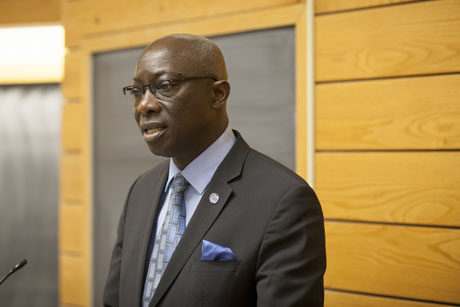Panel tackles lessons of Rwanda genocide
By Kara Beckman

As world leaders gathered in Kigali last week to commemorate the 20th anniversary of the Rwanda genocide, Adama Dieng, the United Nations secretary-general’s special adviser for the prevention of genocide, reflected on the tragedy in a roundtable discussion on campus April 18. Dieng and his fellow panelists discussed issues surrounding the genocide and lessons the international community has learned since the massacre.
The Rwanda genocide in early April 1994 was the result of tensions between two native ethnic groups, the Hutu and the Tutsi. Many Hutu blamed the Tutsi for Rwanda’s economic struggles, and when the Hutu president was assassinated, the Hutu implemented a mass killing that left 800,000 people – mostly Tutsi – dead.
Dieng addressed the U.N.’s failure to prevent or stop the genocide, citing a “well-recognized fact in international relations that no state can interfere with another state without permission.” However, the sanctity of the state, created to promote peaceful coexistence between nations, does not grant states permission to violate their citizens’ human rights.
Since the abysmal international response to the bloodshed in Rwanda, Dieng said, much has changed. At the 2005 World Summit, the U.N. accepted the Responsibility to Protect principle, which asserts that states have a “duty to prevent” crimes like genocide. Should the state fail in this duty, the international community may step in to prevent these kinds of atrocities. Also, the International Criminal Tribunal for Rwanda, set up in November 1994, led to the formation of the International Criminal Court.
Genocide survivor Consolee Nishimwe gave her account of the terror and uncertainty her family faced as they were forced to flee their home and go into hiding. “I remember [the Hutu] singing, ‘Kill all of the cockroaches,’” she recalled. Dieng commented that one group’s feeling of superiority over another is often “the fuel for genocide.”
Professor of government Nicolas van de Walle warned that despite new measures like the Atrocity Prevention Board established in 2011, the United States hasn’t learned much from Rwanda. This is evident in the debate over Syria, he said, where “realpolitik has pushed humanitarian concerns aside.”
The repercussions of the genocide appear to have resonated more strongly nearer Rwanda. The African Union, formed in 2001, has recommitted to preventing atrocity crimes, and its peacekeeping efforts are much more successful now than its predecessor, the Organization of African Unity, was 20 years ago. Additionally, the work of nongovernment organizations in places like Syria has become more effective. While the panelists agreed that these are positive steps, it is not enough, as measures enacted since Rwanda have failed to prevent other genocides.
The most important measure for state and nonstate organizations to employ will be early warning, Dieng said. It is crucial that the U.N. and other organizations in potentially violent states share early indications of potential atrocities, he added, especially in areas of Africa where poor economic conditions could trigger another genocide.
The Rwanda genocide will “always be a scar on the human conscience,” Dieng said, and if there is one thing that the world should learn as it moves forward from this tragedy, it’s that “genocide does not have to occur for us to find new ways to prevent genocide.”
The panel was presented by the Mario Einaudi Center for International Studies. Kifle Gebremedhin, professor of biological and environmental engineering, moderated the discussion, and professor of law Muna Ndulo also served as a panelist.
Kara Beckman ’17 is a writer intern for the Cornell Chronicle.
Media Contact
Get Cornell news delivered right to your inbox.
Subscribe